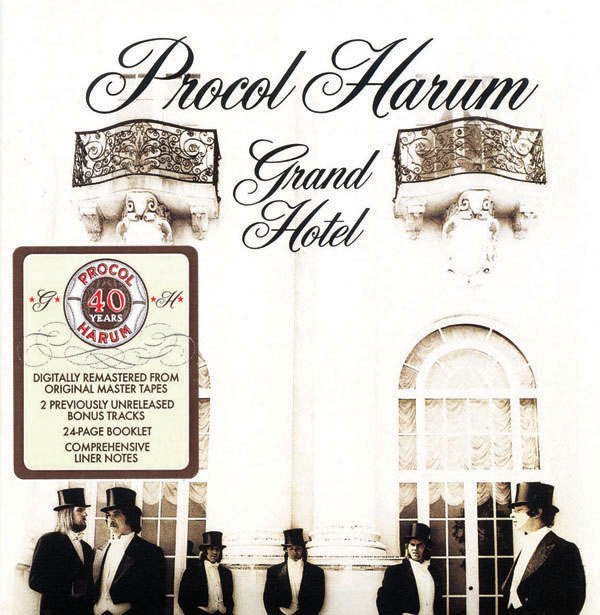Grand Hotel
The seventh reissue
reviewed
online by Dmitry M Epstein
Order
from The BtP Store where there are lots of other Procol
goodies as well; or get it
from Amazon (click here)
and Amazon
UK here
From the lofty to the low, the decadence looms
large – in small detail.
 For
all the grandiosity of Procol Harum’s works, the band never overtly declared the
opulence they could offer, only hinting on that in the ghostly Shine on
Brightly, and it possibly took the orchestral album to free the group from
whatever concept shackles there were. Now, understatement is no more and the
rococo splendour settles in from the opening lines of the title composition –
Gary Brooker's piano and voice echoing of the empty hall's walls, Keith Reid's
lyrics depicting viands and other pleasures – but it's still full of spectres
having a ball, The Shining-way. The strings, the wind and the choir
bouncing off Alan Cartwright's bass lift it heavenly high, especially so in the
instrumental dance in the middle, but as the bonus, group-only,
close-to-a-live-take version shows, the anthemic transcendence is rooted in the
piece's sparseness rather than its lush frosting. That's the key to this album.
For
all the grandiosity of Procol Harum’s works, the band never overtly declared the
opulence they could offer, only hinting on that in the ghostly Shine on
Brightly, and it possibly took the orchestral album to free the group from
whatever concept shackles there were. Now, understatement is no more and the
rococo splendour settles in from the opening lines of the title composition –
Gary Brooker's piano and voice echoing of the empty hall's walls, Keith Reid's
lyrics depicting viands and other pleasures – but it's still full of spectres
having a ball, The Shining-way. The strings, the wind and the choir
bouncing off Alan Cartwright's bass lift it heavenly high, especially so in the
instrumental dance in the middle, but as the bonus, group-only,
close-to-a-live-take version shows, the anthemic transcendence is rooted in the
piece's sparseness rather than its lush frosting. That's the key to this album.
But what comes up must come down, and the tired elevation
reprised in the otherworldly solemn Fires (Which Burn Brightly),
featuring Christiane Legrand's soaring soprano, comes counterbalanced with a
goose-grease groover that is Bringing Home the Bacon, a psychedelic
downside to the title number's well-mannered feast with Chris Copping's organ
and Mick Grabham's (in early run, Dave Ball's) guitar rolling on the floor. And
then, there's acoustic A Souvenir Of London, a deliberately raw shanty
that, on-stage, required all the band to step forward and BJ Wilson swap his kit
for a mandolin a full ensemble of which the drummer employs here
[?] to make the aftermath of a night on the town
(no, it's not a shameful disease as the word has it) feel alluringly dirty.
That's where the action is, even though another phantom is dying, anchored to
the ground by harmonica, in the dramatically growing tension of For Liquorice
John.
More posh ways of escape are offered in the stately ballad A
Rum Tale that sets Hammond against the orchestral backdrop and in the
carousel swirl of Toujours l'Amour, where the regular subject for the
blues takes an organ – oiled and guitar – spiked noble turn. And while the brisk
and a little risqué TV Ceasar brings the modern culture closer to home
with its low-ceiling symphony graffito'ed with electric axe, the exit lies in
the Latin flavour, handclaps and multi-tracked vocals of Robert's Box, an
ode to drugs, which ends the album on an unexpectedly prosaic note. A note that
hides a hint: the opulence of Grand Hotel might be only a projection of
one blissful delirium.
5 stars out of 5
 For
all the grandiosity of Procol Harum’s works, the band never overtly declared the
opulence they could offer, only hinting on that in the ghostly Shine on
Brightly, and it possibly took the orchestral album to free the group from
whatever concept shackles there were. Now, understatement is no more and the
rococo splendour settles in from the opening lines of the title composition –
Gary Brooker's piano and voice echoing of the empty hall's walls, Keith Reid's
lyrics depicting viands and other pleasures – but it's still full of spectres
having a ball, The Shining-way. The strings, the wind and the choir
bouncing off Alan Cartwright's bass lift it heavenly high, especially so in the
instrumental dance in the middle, but as the bonus, group-only,
close-to-a-live-take version shows, the anthemic transcendence is rooted in the
piece's sparseness rather than its lush frosting. That's the key to this album.
For
all the grandiosity of Procol Harum’s works, the band never overtly declared the
opulence they could offer, only hinting on that in the ghostly Shine on
Brightly, and it possibly took the orchestral album to free the group from
whatever concept shackles there were. Now, understatement is no more and the
rococo splendour settles in from the opening lines of the title composition –
Gary Brooker's piano and voice echoing of the empty hall's walls, Keith Reid's
lyrics depicting viands and other pleasures – but it's still full of spectres
having a ball, The Shining-way. The strings, the wind and the choir
bouncing off Alan Cartwright's bass lift it heavenly high, especially so in the
instrumental dance in the middle, but as the bonus, group-only,
close-to-a-live-take version shows, the anthemic transcendence is rooted in the
piece's sparseness rather than its lush frosting. That's the key to this album.